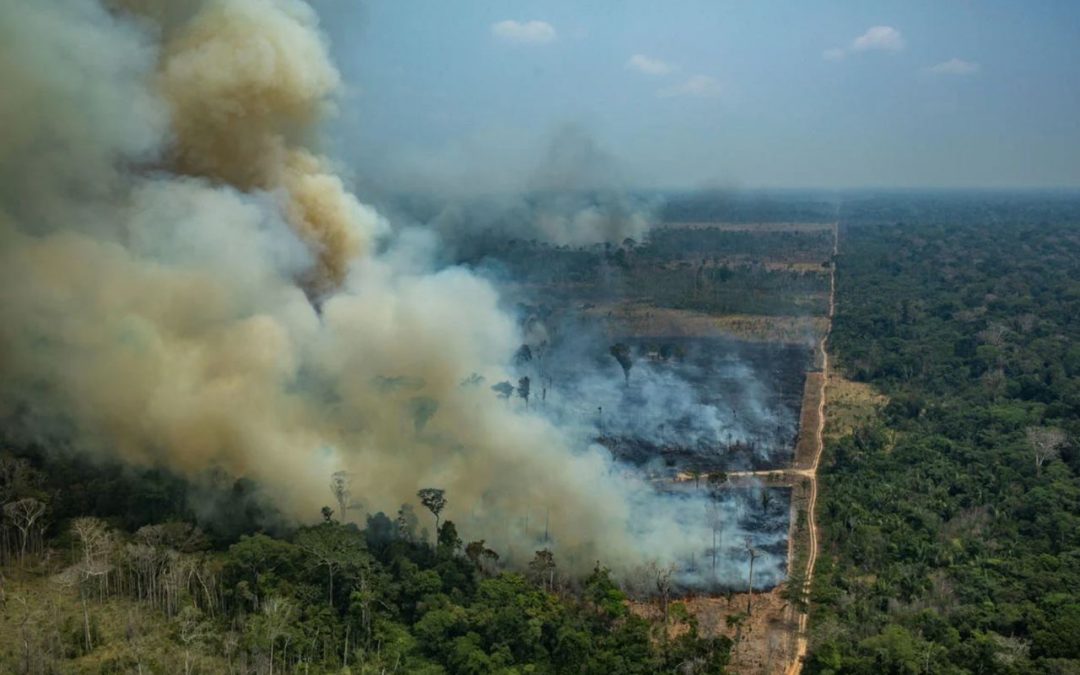
04/Aug/2021
Early last night (August 3rd), Brazilian congressmen showed the interests they stand for, approving the Bill 2633 known as “PL da Grilagem” (Land Grabbing Bill) with a large majority (296 x 136 votes). The approved text was not previously presented to civil society, a typical behavior of anti-democratic regimes.
They argue that the bill is a necessary instrument to register land for small farmers. However, Brazil already has a land reform framework and land allocation policies that only need to be effectively implemented. The approved text, which is now following for the appreciation by the Federal Senate, legalizes the illegal: it regularizes criminally appropriated lands, in processes that often include violent acts against indigenous peoples and traditional communities.
Grilagem means land grabbing. For those unfamiliar with the expression, it is the name given to the invasion, occupation and illegal trade of public areas. This crime has now been converted into law. The practice is directly linked to deforestation, to the destruction of biodiversity and threatens indigenous peoples who traditionally occupy territories, now usurped by land grabbers.
According to the Amazon Environmental Research Institute (Ipam), around 30% of deforestation and burning in the Amazon occurred on public lands without designation, which were possibly targeted by land grabbers. Still, studies by Imazon estimate that if PL 2633 effectively becomes a law, it will cause an additional deforestation of up to 16 thousand square kilometers, an area almost 3 times the size of the Brazilian Federal District.
Theft of public land is nothing new in Brazil. What is unprecedented is that the State, which should look after the common good, shamelessly decides to reward thieves and usurpers with the regularization of stolen lands. This ethical and legal aberration puts our forests, our biodiversity and the peoples who depend on them – especially indigenous peoples, traditional communities and family farmers – on their knees in the face of the typical violence processes of invasion and illegal appropriation of land.
While the whole world discusses ways to keep forests standing as a solution to climate change, the Brazilian government continues to “passar a boiada” (pass the cattle), opening the way for an increase in deforestation rates, which goes against its own commitments to zero illegal deforestation.
Indigenous peoples express their consternation over this absurd and irresponsible sign emanating from the self-proclaimed “People’s House”. By approving this project, the Chamber demonstrates that it is gradually and unavoidably becoming the home of ruralists, agribusiness, deforesters, land grabbers – all of them, except for the people.
The Brazilian indigenous movement continues in the struggle for its constitutional rights.
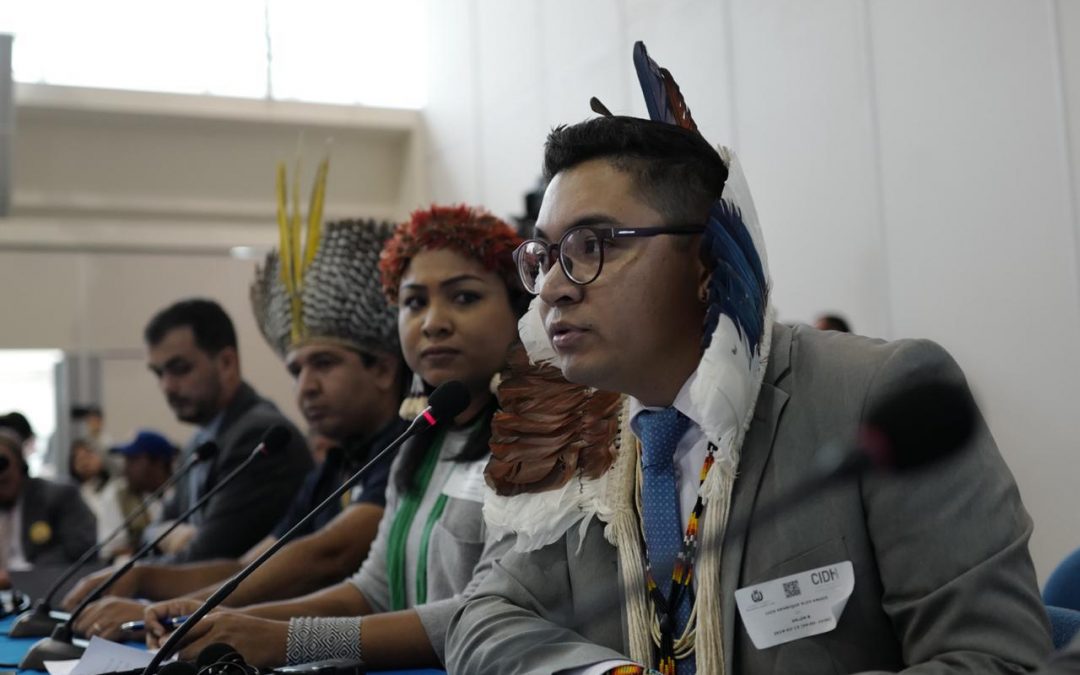
01/Jul/2021
The violence escalation into indigenous territories during Covid-19 pandemic will be on the center of the complaints.
This Thursday, July 1st, the Inter-American Commission on Human Rights (IACHR) receives complaints from indigenous organizations and leaders representing the Munduruku, Yanomami and Guajajara peoples, about the worsening of violence in their territories during the period of Covid-19 pandemic. The action is part of the 180th Session of the Commission and meets the request of the Articulation of Indigenous Peoples of Brazil (Apib) in conjunction with the Coordination of Indigenous Peoples of the Brazilian Amazon (COIAB), Association of Munduruku Wakoborũn Women and Hutukara Association, in addition to other partners.
“The escalation of violence foreshadows even more tragic results, and that is why it is essential this Commission takes all appropriate measures.”, highlights an excerpt from the communiqué sent to the IACHR to request the hearing that takes place today (1). Access the document presented to the IACHR here.
On June 18, Brazilian Constitutional Court unanimously determined the protection of the Munduruku and Yanomami peoples to prevent further massacres in the territories. The court ruled on the request made by the Articulation of Indigenous Peoples of Brazil (Apib) for the urgent removal of invaders, especially from Indigenous Lands (TIs) Munduruku, in Pará, and Yanomami, in Roraima, and to guaranteeing the physical integrity of the threatened people in these locations.
Invasions into indigenous territories increased during the covid-19 pandemic, and are aggravating violence against communities and leaders, causing outbreaks of diseases such as malaria, in addition to the new coronavirus, and intensifying environmental degradation. Apib’s request to the STF for the protection of the territories was made within the scope of 709 Action for Non-Compliance with Fundamental Precept (ADPF). Access the full request here.
Session
The hearing with the IACHR to denounce the violence committed against indigenous peoples is scheduled to start at 12:00 pm (Brasilia time) and will be broadcast online on the commission’s social networks. During the 180th Session of the commission, several complaints will be made about violations of rights committed in Brazil during the period of the Covid-19 pandemic.
The hearing that highlights the context of indigenous peoples counts on the participation of the legal coordinator of Apib, Eloy Terena, the vice president of the Federation of Indigenous Peoples of Pará (Fepipa), Alessandra Munduruku, the vice president of the Hutukara association, Dario Yanomami, the coordinator of the Association Wakoborũn Leusa Munduruku and indigenous leader Julius Ye’kwana.
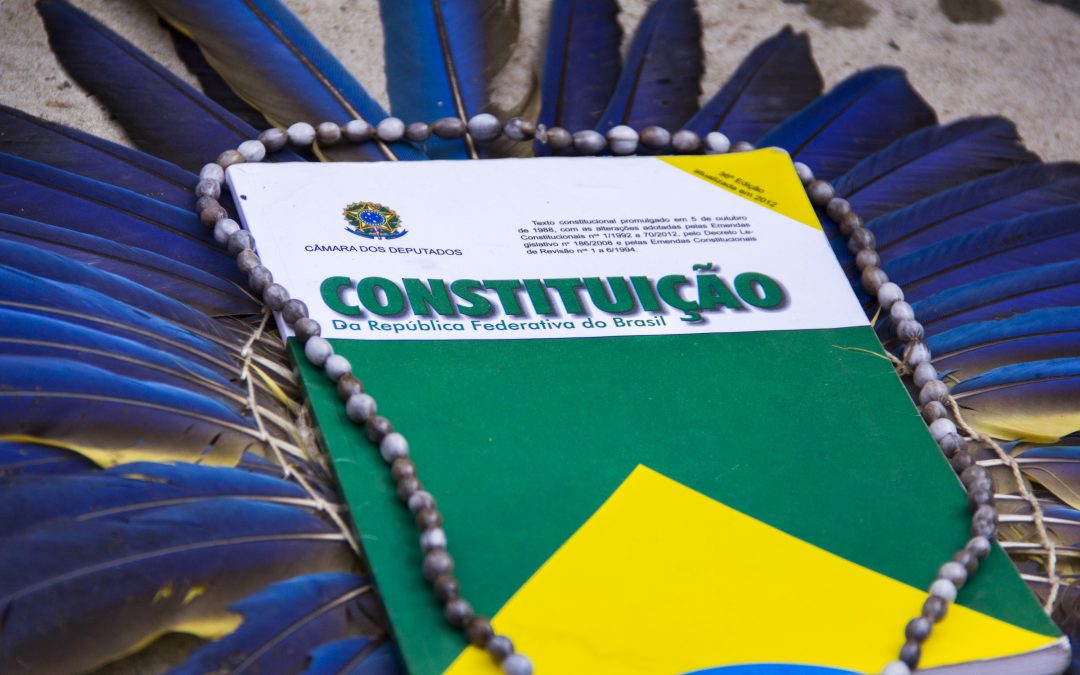
06/May/2021
APIB denounces to the Brazilian Federal Supreme Court and to the Inter-American Commission on Human Rights (IACHR) political persecution of the Bolsonaro government against indigenous peoples
The Articulation of Indigenous Peoples of Brazil (Apib) filed a report yesterday, 5, at the Inter-American Commission on Human Rights (IACHR) and at the Federal Supreme Court (STF) about the Federal Government’s political persecutions against Apib and Sonia Guajajara, one of the executive coordinators of the organization.
On April 26, during the month of the largest indigenous mobilization in Brazil and in the week following the Climate Summit meeting, the Federal Police (PF) summoned Sonia to testify in an open police investigation by the National Indian Foundation (Funai). The governmental agency, whose institutional mission is to protect and promote the rights of the peoples of Brazil, accuses Apib of defaming the Federal Government with the web series “Maracá” (http://bit.ly/SerieMaraca), which denounces right violations committed against indigenous peoples in the context of the Covid-19 pandemic.
“We alert the Inter-American Commission on Human Rights to the escalation of authoritarianism underway in Brazil. The democratic environment is at risk. In no republican and democratic state can the state apparatus be used under the discretion of its rulers. The free expression of thought and freedom of expression, supported by constitutional, conventional and legal principles, cannot be criminalized ”, reinforces Apib’s legal coordinator, Luiz Eloy Terena, in the report sent to the IACHR.
All violations of rights against indigenous peoples during the Covid-19 pandemic exposed by Apib in the Maracá series were presented to the STF in 2020, in the Fundamental Precept Failure Statement (ADPF) No. 709. On that occasion, the main court of the country acknowledged the complaints presented and determined that the Federal Government should adopt measures to protect the indigenous peoples. So far, the STF’s decision has been partially accepted by the government.
“The inquiry opened by the PF is a clear attempt to limit freedom to be critical, whether against the government or against its political agents, even if this is also part of the Democratic Rule of Law and that matters of public and social interest are under the tutelage of the constitutional cloak of the right to information ”, reinforced Eloy Terena in an excerpt from the complaint presented to the STF minister Roberto Barroso, who is the rapporteur for ADPF 709.
Inquiry suspended
On the same day of the denunciations made to the STF and IACHR, the Federal Court of the Federal District determined last night (5), at the request of Apib, to close the investigation opened by the Federal Police. Apib filed a lawsuit on May 3 to annul the investigation, which is an action of political persecution.
“It is also worth mentioning that the clear mention in FUNAI’s letter about alleged slanderous conduct against the President of the Republic suggests that the whole situation narrated has the main purpose of silencing political manifestations disclosed by an entity that stands against the present Federal Government”, federal judge Frederico Botelho argued in his decision.
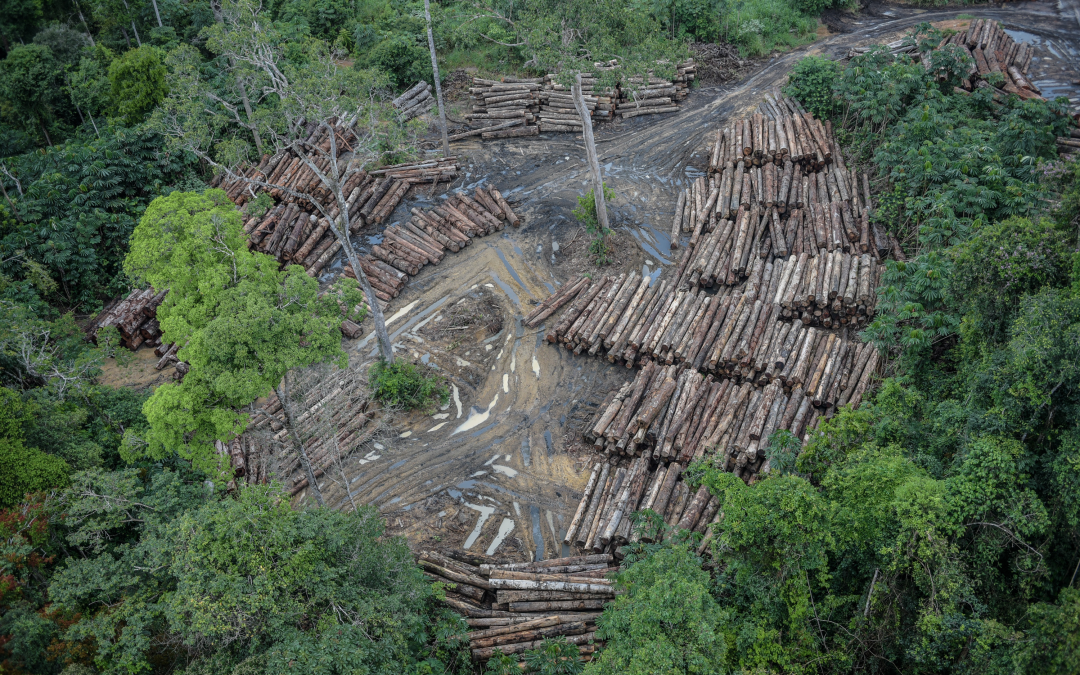
06/Apr/2021
Nearly 200 Brazilian organizations warn American President about risks of a closed-doors negotiation with the Brazilian ruler.
A group of 199 Brazilian civil society organizations released today (6th) a letter to the American government, warning that a forthcoming cooperation deal between the United States and the Bolsonaro administration could bring a risk for the environment, human rights, and democracy.
The Joe Biden administration has been negotiating for several weeks, behind closed doors, an environmental agreement with the government of Jair Bolsonaro. Such deal is to be announced in the climate summit convened by the US President for the 22nd and 23rd of April. Sources close to the talks say the agreement shall involve money transfers to Brazil. In the campaign trail, Biden talked about raising US$ 20 billion to save the Amazon.
According to the letter, the negotiations with Bolsonaro – a denier of the Covid pandemic who has dismantled Brazil’s longstanding environmental policy and who was sued by indigenous peoples in the International Criminal Court for crimes against humanity – put to test Biden’s inaugural speech: the American President promised then to fight the pandemic, structural racism and climate change, and to reclaim America’s place in the world through “the power of its example”. “President Biden needs to choose between being true to his speech and lending political prestige and money to Bolsonaro. He can’t have both.”
The text also states that any dealings with Brazil about the Amazon must involve civil society, subnational governments, academia and the private sector. And no talks should move forward until Brazil has slashed deforestation rates to the level required by the national climate change law and until the string of bill proposals sent do Congress containing environmental setbacks is withdrawn.
“Any deal that fails to respect those premises would be an endorsement do the humanitarian tragedy and to the environmental and civilizational setback imposed by Bolsonaro”, the NGOs say. “It is not sensible to expect any solutions for the Amazon to stem from closed-door meetings with its worst enemy.”
“The Bolsonaro government strives to legalize the exploitation of the Amazon, bringing irreversible damage to our territories, to our peoples and to life in this planet. We are united to harness all support we can get that may strengthen the fight for our lives and for Mother Earth. We remain mobilized against the genocidal project that has been trying to eliminate us for more than 520 years in Brazil and which also destroys our biodiversity. That is why we insist: indigenous blood, not one drop more”, says Alberto Terena, executive coordinator of Apib (Brazilian Indigenous Peoples’ Articulation).
“When the Cerrado, the Amazon or the Pantanal burn, our people burn. The Bolsonaro government strikes bilateral deals that go against our Constitution and destroy nature; he does not respect our territories and he’s making no effort to demarcate them. Even in this moment of pandemic, in which we can’t bury or mourn our dead, Bolsonaro keeps trying to defeat us, through the destruction of our biodiversity”, declares Biko Rodrigues, national articulator of Conaq (National Coordination for the Articulation of Black Rural Quilombola Communities).
“Brazil is today a divides country. On one side there are indigenous peoples, quilombolas, scientists, environmentalists and other people that fight for life and against deforestation. On the other side is the Bolsonaro regime, threatening human rights and democracy and puts the Amazon in risk. Biden must pick a side”, says Marcio Astrini, executive secretary of the Climate Observatory.
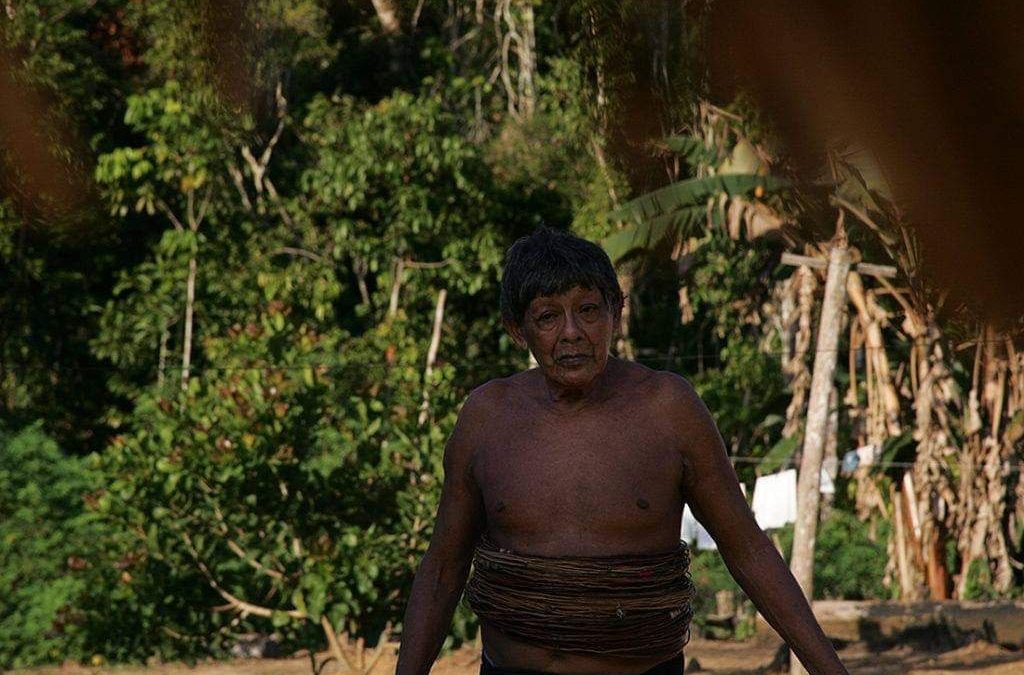
18/Feb/2021
The death of the last man of the Juma indigenous people, the warrior Amoim Aruká, by complications from Covid-19, is heartbreaking. The Juma people have suffered numerous massacres throughout their history. From 15,000 people at the beginning of the 20th century, it was reduced to five people in 2002. A proven, but never punished, genocide that led its people almost to complete extermination. The last massacre took place in 1964 on the Aswan River, in the Purus River basin, perpetrated by Tapauá city’s traders interested in the sorghum and chestnut in the Juma territory. In the massacre more than 60 people were murdered, only seven survived. Members of the extermination group hired by the merchants reported shooting at the Juma people as if they were shooting at monkeys. The indigenous bodies were seen by other traditional people (ribeirinhos) in the region after the massacre, serving as food for wild pigs and countless decapitated heads scattered on the forest floor. The mastermind of the crime, aware of what had happened, boasted that he was responsible for ridding “Tapauá city out of these ferocious beasts”. This story must never be forgotten.
Aruká, one of the survivors, continued his resistance struggle, seeing his people verging on disappearance. He fought for the demarcation of the Juma territory, which was only approved in 2004, the Juma Indigenous Land (TI). The Juma survivors, despite the risk of disappearance, saw their people grow again in the 2000s, through marriages with indigenous Uru Eu Wau Wau, indigenous people also of Tupi-Kagwahiva language branch.
Because they are subject to an immense vulnerability and risk of disappearance, the Juma people are considered to be of recent contact and are among the indigenous ethnical groups to be protected by Sanitary Barriers, whose installation was determined by the Supreme Federal Court at the request of indigenous peoples, representatives of the Coordination of the Indigenous Organizations of the Brazilian Amazon (COIAB), through the Articulation of the Indigenous Peoples of Brazil (APIB), in the Statement of Noncompliance with Fundamental Precept No. 709 (ADPF 709). The request was made in July 2020 and Minister Luís Roberto Barroso accepted. However, given the difficulties alleged by the Bolsonaro government, the minister gave the deadline until September 2020 for the Barriers in the Juma indigenous land to be installed. In August 2020, the Bolsonaro government said it would build the Barrier on the Assuã River, at REBIO Tufari, outside Juma land, it would be a Sanitary Barrier composed of the Military Police and Special Indigenous Health District (DSEI)-Humaitá. However, in December of the same year, he stated that he would make only one access control post on the BR 230 – Transamazônica Highway, but did not prove its effective functioning.
Whether the access post worked or not, as representatives of COIAB and APIB had been charging for months in the Situation Rooms with the Bolsonaro Government, it no longer matters for Aruká. What is known is that he is now dead. Sadly, it is through their dead that indigenous peoples prove their appeals. COIAB and APIB warned that indigenous people of recent contact were at extreme risk. The last surviving man of the Juma people is dead. Again, the Brazilian government proved to be criminally silent and incompetent. The government murdered Aruká. Just as he murdered his ancestors, it is a devastating and irreparable indigenous and humanitarian loss.
Manaus, Amazonas, February 17, 2021.
Coordination of Indigenous Organizations in the Brazilian Amazon (COIAB)
Articulation of Indigenous Peoples of Brazil (APIB)
Opi – Observatory of Human Rights of Isolated Indigenous Peoples and of Recent Contact
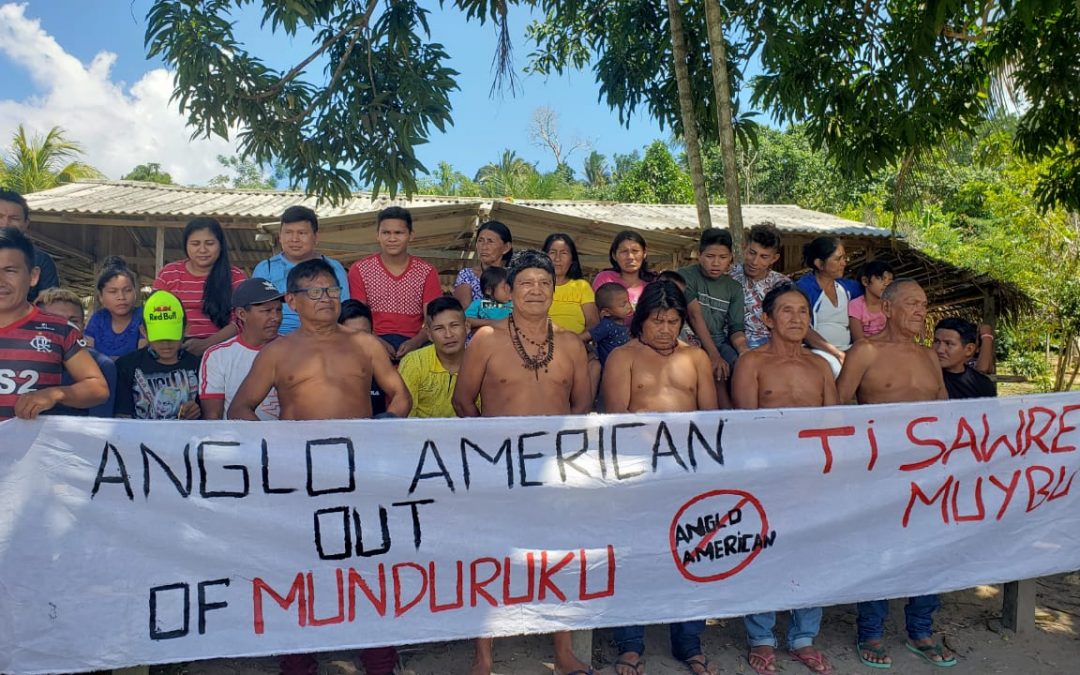
09/Feb/2021
The mining giant clarified this decision in response to a letter by the Association of Brazil’s Indigenous Peoples (APIB) and Amazon Watch, in support of the Munduruku people demanding Anglo American immediately withdraw applications for copper exploration on Sawré Muybu land.
Brasília/Brazil, Oakland/USA – On January 25, British mining company Anglo American responded to the open letter from the Association of Brazil’s Indigenous Peoples (APIB) and Amazon Watch from December 22, in which the organizations demanded that the mining company make a public commitment not to carry out mining activities on Indigenous lands in Brazil, regardless of changes to Brazilian legislation. In its response, Anglo American states: “We cannot make a commitment to rule out any mining activities on Indigenous Lands in Brazil.”
Without mentioning Bolsonaro’s new policy that authorizes mining on Indigenous lands (PL 191/2020), Anglo American says that all legislative changes that affect Indigenous rights must be made in consultation with the potentially affected communities, and “such consultations should appreciate the complexity and diversity of communities, and that their aspirations may differ, with some communities welcoming mining and others deciding against it.”
However, Bolsonaro’s bill proposes to reclaim full control over land use, while removing the veto power of Indigenous peoples in relation to the exploration of their territories. Mining would only require approval at the President’s discretion, after a merely symbolic consultation process with Indigenous peoples to confirm projects.
After receiving this response, APIB requested a meeting with Anglo American to explain and share once again the demands of the Indigenous movement and communities potentially impacted by the mining company and replied to Anglo American in a response letter. For APIB, Anglo’s response is insufficient. “We are waiting for a new resolution by Anglo American, which should be only one for Indigenous peoples: to publicly commit to cease mining activities on Indigenous territories in Brazil. It is important to remind the mining company that the majority of Indigenous peoples and communities in Brazil do not share the desires of a minority of Indigenous individuals who are deluded and yield to the veiled evil intentions of this government,” according to Eloy Terena, APIB’s Legal Coordinator.
APIB’s and Amazon Watch response letter to Anglo American can be read here.
Background
On November 20, in response to the Business and Human Rights Resource Center, Anglo American stated that it had given up all applications for mineral exploration inside Indigenous lands in Brazil and that it would contact the Brazilian National Mining Agency (ANM) to update its applications, following the release of the Complicity in Destruction III report, published by APIB and Amazon Watch. However, on November 27, InfoAmazônia revealed that the National Mining Agency (ANM) had granted permission for 27 of the mining company’s applications for copper prospection within Indigenous territories in the states of Mato Grosso and Pará. Of those 27, 13 are for prospecting in the Sawré Muybu territory.
In the response sent to APIB, the mining company claimed “adhere to local laws and international standards when engaging with Indigenous Peoples and we will seek to obtain Free, Prior and Informed Consent (FPIC) of Indigenous Peoples prior to conducting activities that require access to Indigenous Peoples’ lands and/or impact Indigenous Peoples’ livelihoods or cultural heritage during all stages of exploration.” Anglo American also alleged, to respect “the right of indigenous communities to oppose mining-related activities on their land and will refrain from undertaking any activities if consent is withheld.”
However, the company fails to mention any consultation efforts with the Munduruku people and even though it acknowledges having three concession applications that overlap the Sawré Muybu Indigenous Territory.
The Munduruku people have made their veto clear in a recent demonstration held on January 16, in the Sai Cinza village, in Itaituba, state of Pará. With a banner, they sent their message in English: “Anglo American: Out of Munduruku – TI Sawré Muybu.”
Alessandra Munduruku, a Munduruku leader and warrior, shared photos from the action on her Facebook page, with the message: “The Anglo American mining company requested authorization to ANM to explore the Sawré Muybu Indigenous Territory—[it is] a mining company that destroys forests, rivers, and Indigenous peoples. We are here inside [our territory] and will continue to be. Anglo American—Get Out! Demarcation Now! The people will go on resisting.”
At the Munduruku People Resistance Forum, held in December 2020, the Munduruku mentioned mining and the presence of large mining companies on their territory, such as Anglo American, as high-impact threats to their territories and communities in a heartfelt announcement demanding the recognition of the Munduruku’s rights to life and land.
In support of the demands issued by the Munduruku, APIB and Amazon Watch have published a petition that will be sent to Anglo American to pressure the mining company to withdraw its mining applications on Indigenous territories.
The Munduruku people and all Indigenous peoples who may be impacted by Anglo American’s activities demand that the mining company make a public commitment to cease all mining activities in Indigenous territories in Brazil and that it withdraw all applications for mineral exploration in Indigenous territories. Only then would Anglo American be in line with their human rights and biodiversity protection pledges, particularly the ICMM Position Statement on Mining and Protected Areas.
Anglo American’s full response and clarification regarding their mineral research applications on Indigenous lands can be read here. And its policy for Indigenous peoples is summarized in a document called Social Way, available here.
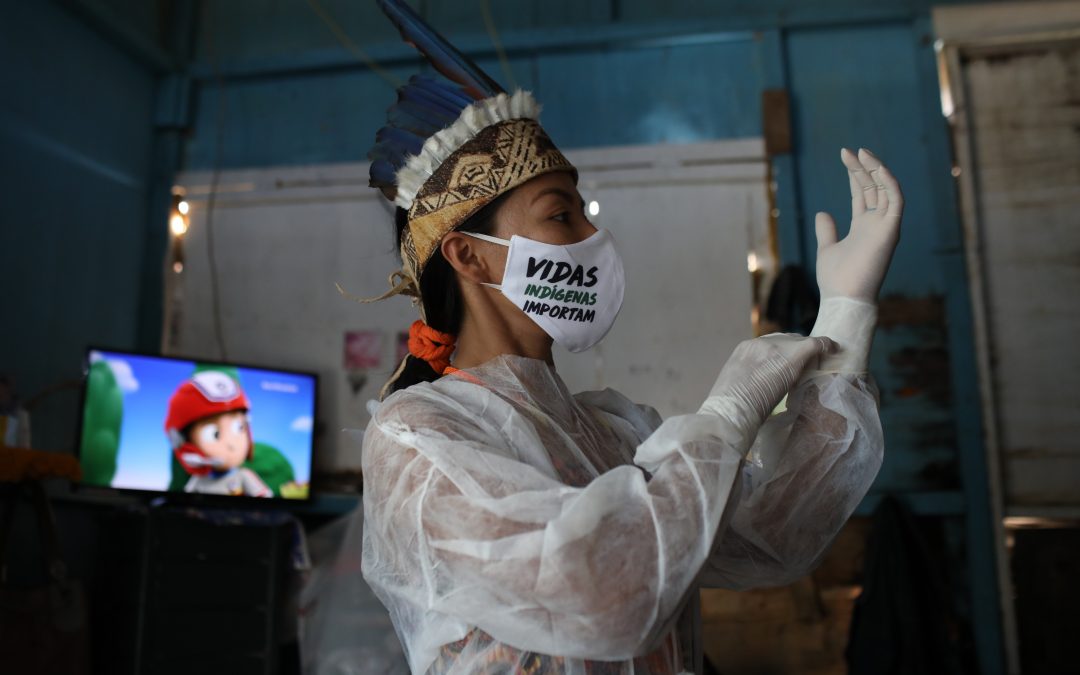
10/Dec/2020
Indigenous Lives Matter. And in the midst of the pandemic, our lives have become the subject of attacks, persecution and extermination. This manifesto is about the struggle for indigenous lives. Lives neglected by the government and lives saved by solidarity. Lives we lost, and lives that we try to protect. The life of indigenous people who are in villages and cities, but above all, our life in the broader sense and which is under intense attack: our territories, our identity and ways of life, forests, rivers, biodiversity … Mother Earth.
By November 2020, more than 41 thousand indigenous people were contaminated by new coronavirus, reaching more than half of the 305 people living in Brazil.
We, of the Articulation of Indigenous Peoples do Brasil (Apib), and all of our grassroots organizations, with representations in five regions of the country, in the face of the COVID-19 pandemic, we strive daily for peoples’ lives.
It was between March and November 2020, that violence against indigenous peoples increased both inside and outside our territories. The criminals who invade our lands have not been quarantined let alone working home office. We affirm that the worsening of violence against indigenous peoples, during the pandemic, was encouraged by Bolsonaro.
What the federal government actually did in this period? It tried to use the health crisis and the pandemic to “pass the cattle” over our rights, our bodies and our lands. Such actions marked the government of the current president and senior echelon of the federal government during the humanitarian and health crisis, which also reached our peoples and communities.
We warn that this situation of violence directly and indirectly affects our 305 peoples, relatives in voluntary isolation and also the Warao indigenous people, who are refugees from Venezuela and live in a situation of extreme vulnerability in Brazil.
With speeches filled with racism and hatred, Bolsonaro encourages violence against
our communities and paralyzes the actions of the State that should promote assistance, protection and guarantees of our rights. It tries to take advantage of the “opportunity” of this crisis to proceed with a series of decrees, ordinances, normative instructions, provisional measures and bills to legalize crimes and diminish the constitutional rights of indigenous peoples. They were silent actions in protection and active in plundering.
More than 1 million people died around the world as a result of the spread of Covid-19 (until the end of November), and Brazil reached, in July, the highest number of deaths among countries.
Indigenous peoples were proportionally the most affected by the virus. The number of deaths reached 880 in nine months, according to the community participatory monitoring project carried out by the National Committee for Indigenous Life and Memory, created by Apib and its grassroots organizations and partners. A tragedy unparalleled in recent history. Way more than numbers, they were our shamans, our prayers, midwives, elders and chiefs who left. We lost our elderly people, the ones who keep the memories of our ancestry, guardians of knowledge, of songs, of prayers, of our spirituality. Leaders who dedicated their lives to the struggle to defend the territory, the integrity and the physical and cultural existence of their peoples. We suffer in our mourning for this tragedy that affects not only us indigenous people, but all of humanity.
The pandemic exposed the hate policy that Apib had already denounced. Political violence and persecution have further accelerated. From March to November, more than 200 fundamental human rights violations against indigenous peoples were recorded. An alarming situation that gets worse every day.
In this atmosphere of terror, the federal government promotes the greedy fury of agribusiness, mining companies, corporations and international investment funds.
Encourages the action of land grabbers, invaders, and so many other criminals who continue to advance into indigenous territories, taking advantage of the tragedy we are experiencing. The fire and deforestation, carried out in 2020, can not be denied in the face of satellite images and our horizon permanently foggy. It seems that in the flames they see profit, and in felled trees, there is only greed.
TURNS OUT WE DECIDED NOT DIE, BUT FIGHT TIRELESSLY IN DEFENSE OF LIFE.
We denounce the aggressions against our rights in the legislative scope, which validate racism, dehumanize our existence and who want to extinguish our self-determination over our territories and lives. We have appealed to the Judiciary to defend our assured rights by the Brazilian Constitution of 1988. Over these eight months, we provoked the judiciary through actions, including Arguition for Failure to Comply with Fundamental Precept (ADPF) 709 in the Federal Supreme Court (STF). We achieved victories, such as the determination of the STF to oblige the Federal Government to fulfill its duty in protecting indigenous peoples in the context of the pandemic. A Supreme Court decision, which still wasn’t met by Bolsonaro.
Apib and its grassroots organizations keep working daily to strengthen, protect and value indigenous health professionals. Especially to our relatives who are on the front line facing this crisis, even though they are one of the greatest risk groups of Covid-19. We reinforce that the Special Secretariat for Indigenous Health (Sesai) is the result of the struggle and mobilization of Apib and the entire indigenous movement.
We created the “Indigenous Emergency” plan due to the active omission of the Federal Government in fighting the virus. We do not want to replace the role of the State, on the contrary, we continue to demand the implementation of public policies that guarantee our
rights. But we also can’t stay with our arms crossed. In this sense, we were able to articulate resources and materials to equip, on an emergency basis, several Special Indigenous Sanitary Districts (DSEIs) in several states. We deliver test equipment, hygiene materials, personal protective equipment, oxygen, concentrators, and we enable the installation of Indigenous Primary Care Units (UAPIs) in various territories.
On our own initiative, we created and maintained hundreds of health barriers to prevent the virus from reaching communities. A measure that the Federal Government does not just neglected but tried to sabotage in different ways. This basic action, that our communities have implemented on their own, was instrumental in minimizing the impacts of the new coronavirus among our relatives across the country.
At our bases we continue to resist, inspired above all by the strength of indigenous women and our ancestors. We care for the land and strengthen ourselves in the forests, rivers, prayers and our traditional medicines. We perform our rituals, we cry our mourning. And we keep looking for strength.
In the social networks, we played our Maracás. We demarcated the screens and resignified our mobilizations over the internet. We held the 16th Terra Livre Camp, in 2020 virtually, due to the pandemic, reaching more than 1.5 million people during the four days of online activities. We promoted the National Assembly of Indigenous Resistance, bringing together hundreds of leaders from all over the country and rearticulating our fight strategies. With the Maracá online series, we mobilize the support of hundreds of indigenous and non-indigenous personalities, leaders, artists, scientists, parliamentarians and researchers to our Indigenous Emergency plan. To give us strength, we called on the online Indigenous Women March, to debate the sacred of existence and to strengthen joint actions. We promoted Earth Healing, a global gathering of indigenous women.
From fear, silence, death and terror, we recreate hope! We plant our gardens, fetch water to drink, clean the village floor and fix the roofs with collective work. Living close to Nature. Our life is in defense of the forest, biodiversity and the Planet, and that is why we must fight together in its defense.
Our young people cry for their masters, their examples and life inspirations, but our ancestry is long, millenary and has taught us to dream. From the pain of genocide and persecution, which we are suffering, we have survived close to the ground of our land, which is our blood and exists in every part of this Brazilian territory. And we will not give up on recreating our devastated worlds and continuing our existences.
WE WILL NOT GIVE UP ON LIVING!
Indigenous blood: not a single drop more!
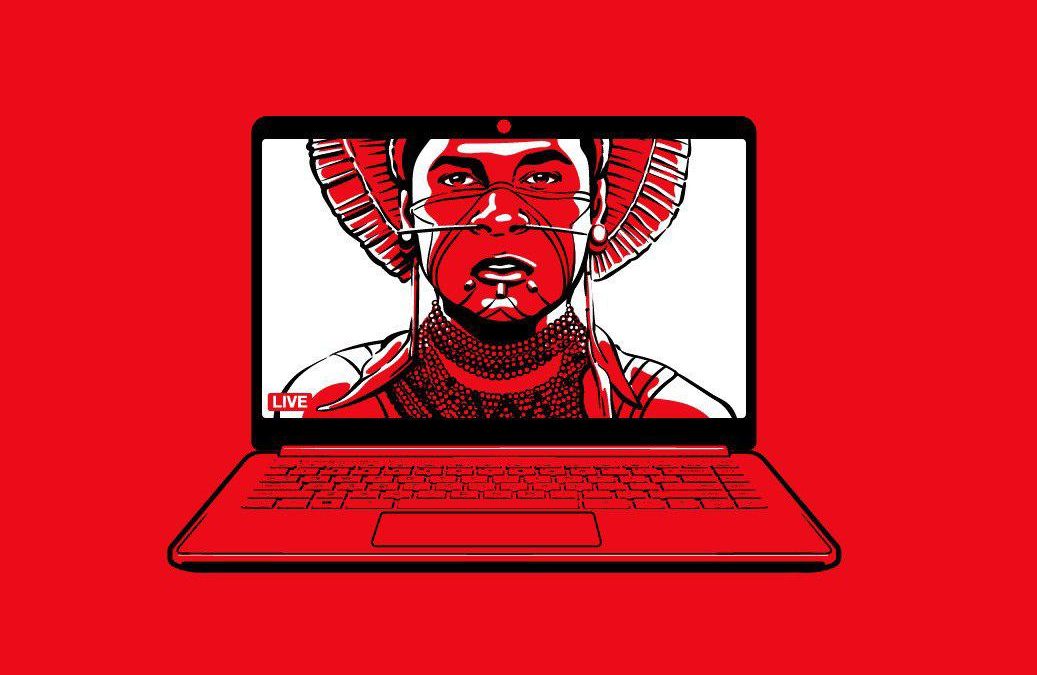
09/May/2020
We, indigenous peoples, organizations and leaders from every region of Brazil, have been gathering for 16 years in the federal capital for our annual Free Land Camp (ATL), the Great National Indigenous Assembly. Due to the need for social isolation imposed by the Covid-19 pandemic, we have held ATL online with a great number of discussions, debates, seminars, testimonies and livestreams throughout the week. For 520 years we have been resisting all kinds of invasions; besides physical violence, forced labor, and the plunder and expropriation of our territories, diseases were used as the main biological weapon to exterminate us. Currently, we are being attacked by the worst virus in the history of our country: the Bolsonaro government. Thus we have come to publicly denounce the following issues.
We denounce to national and international public opinion, that we, indigenous peoples of Brazil, more than 305 peoples, speakers of 274 different languages, are in the crosshairs and victims of a genocidal project of the government of Jair Messias Bolsonaro. Since the beginning of his mandate, he has chosen us as one of his priority targets, saying that he would not demarcate an inch more of indigenous land, and that all land demarcation carried out until now would have been forged, and therefore should be revised.
As soon as he took office, Bolsonaro issued Provisional Measure 870/19, which determined the dismantling of the National Indigenous Foundation (FUNAI) and its powers, transferring the responsibility for environmental licensing and land demarcation to the Ministry of Agriculture, led by the Ruralist Caucus, a parliamentary faction renowned for its hostility towards our peoples, represented in the figure of the agriculturalist Minister Teresa Cristina, also known as the “muse of poison” [for her work to deregulate the use of pesticides]. The suspension of this Provisional Measure by the National Congress required a great deal of effort on our part and from our allies.
Bolsonaro dismantled public policies and bodies that had until then, albeit precariously, served our peoples, appointing people who are openly against indigenous rights, such as the president of the National Indigenous Foundation (FUNAI), federal police officer Marcelo Augusto Xavier da Silva. A former adviser for the Ruralist Caucus during the Parliamentary Inquiry Commission (CPI) of FUNAI / INCRA in 2017, which incriminated civil servants, indigenous leaders, indigenist representatives and attorneys, Xavier da Silva published in the Federal Official Gazette, on April 22nd 2020, the Normative Instruction No. 09 that “rules on the requirements, regulation and analysis to issue a declaration of limits recognition in relation to private properties in indigenous lands”. Since it aims to legitimize and allow the issuance of land titles to invaders of indigenous lands, this measure contravenes the institutional duty of the indigenous body to protect the rights and territories of indigenous peoples. In addition to this decision by the president of Funai, other measures have been taken against indigenous peoples and their rights, namely: (1) the decision to review or to cancel administrative procedures for the demarcation of indigenous lands, such as the Tekoha Guasu Guavirá territory, in Guaíra and Terra Roxa (Paraná state), of the Avá-Guarani people; (2) the replacement or impairment of Working Groups on identification and delimitation issues; (3) the dismantling or alteration of Boards of indigenous bodies; (4) workplace harassment and bullying of public servants; (5) the continuation of public policies for homologated lands only; (6) the irresponsibility of not equipping, even financially, regional coordinations and grassroots groups in order to protect our peoples and territories from the Coronavirus pandemic; (7) authorizations that allow fundamentalist pastors to enter indigenous territories.
Thus, this government, subservient to national economic interests and international capital, aims to reduce and restrict our rights, especially territorial rights, by encouraging illegal practices on our lands, such as: mining, deforestation, logging, cattle farming, monocultures and land grabbing, which is about to be legalized through the bill 910/19, currently progressing through Congress. Further to these illegal practices, there are the constant threats of large-scale mining operations and various infrastructure projects such as hydroelectric plants, transmission lines and roads. All of these are clear attempts to transform public lands into commodities.
All of these illicit and unconstitutional acts constitute a death project for our peoples. They entail the destruction of our forests, our rivers, biodiversity, our life sources. In short, they entail the destruction of Nature, Mother Earth, a heritage that has been preserved for thousands of years by our peoples and that til today strategically contributes to the preservation of environmental and climatic stability and to the well-being of humanity, providing important environmental services to the planet.
It is this heritage that ruralists, agribusiness and international corporations want to steal from us; by restricting or suppressing our constitutional rights, they are actually claiming that our original rights, and our very existence, constitute an obstacle to their enterprises and their so-called development plans. That is why they are trying to reverse the legal basis of our rights, nationally and internationally, through measures such as Opinion 01/17, the ‘time frame thesis’, which aims to limit our right to the lands we have traditionally occupied to only those occupied on October 5th, 1988, date of promulgation of the Federal Constitution, which in fact, simply recognises a right that was already ours, our original birthright to the land, a right we have had since before the colonial invasion and the emergence of the Brazilian national State.
Our extermination seems to be a matter of honor for the Bolsonaro government, which is taking advantage of the pandemic crisis to intensify its negligence towards our peoples. Thus, it is also trying to put an end to the differentiated public policies won over the last 30 years in the education system, alternative economic activities, environmental laws and especially in healthcare. After attempting to bring an end to the indigenous health subsystem (SESAI) via plans to municipalize or privatize it, the spread of coronavirus in our territories has made clear the government’s genuine desire for our extinction: it does not protect us from invaders, on the contrary, allowing them to contaminate our communities, which could lead to mass extinction, beginning with our elders, who are sources of tradition and wisdom for our peoples, for generations to come. And as if that wasn’t enough, the government encourages harassment and violence by private interests over our natural assets and sacred territories. The recent dismissal of the director of environmental monitoring at IBAMA (the Brazilian Institute of Environment and Renewable Natural Resources) after his actions to crackdown on illegal mining in Tis in southern Pará, reveals the intentions of the current government.
Faced with this institutionalization of genocide by the Bolsonaro government, we alert national and international society, and demand the following actions:
1. The immediate demarcation, regularization, monitoring and protection of all indigenous lands;
2. The revocation of Opinion 001/17 of the Federal Attorney General;
3. The immediate removal of all invaders from indigenous lands – miners, land grabbers, loggers, farmers – given that they are destroying our natural resources along with our cultures, and, at this present time in particular, they are spreading diseases and COVID-19; constituting a serious risk for all peoples, especially indigenous peoples in voluntary isolation;
4. The adoption of measures that restrict the access of outsiders in indigenous communities, including miners, traders, loggers, as well as proselytizing fundamentalist religious groups that demonize, in our very own territories, our ways of life, spiritualities, knowledge, traditional ways of treating diseases;
5. The implementation of actions that aim to guarantee basic sanitation, drinking water, adequate housing and other equipment that ensure good sanitary infrastructure in the communities;
6. The adoption of measures that guarantee good nutritional status in all indigenous communities and the guarantee of a permanent plan for food security and sovereignty for our peoples and communities;
7. The facilitation of health teams to enter and remain in indigenous areas, ensuring that preventative actions to protect against the pandemic are effective and continued;
8. Adequate infrastructure and logistical support for health teams, providing them with all the necessary equipment for carrying out disease prevention, such as medicines, serums, gloves, masks, transportation, fuel;
9. The guarantee of referral hospitals – in municipal and state capitals – for medium and high complexity care, providing clinical tests and proper hospitalization for patients with COVID-19 and other diseases;
10. Financial resources for protective materials for all people in indigenous communities, such as clean water, soap, bleach, alcohol gel, gloves and masks, as well as adequate guidance in the importance of using these materials during the Covid-19 pandemic;
11. Provide adequate training for indigenous health workers, hygiene and environment officials, midwives and all those working in the health sector within communities, to protect and prevent COVID-19;
12. The immediate hiring of health professionals – doctors, nurses, nursing technicians, epidemiologists – to work in indigenous areas, to increase the current healthcare teams;
13. The immediate purchase of COVID-19 tests for as many people as possible in all indigenous communities, in order to get a proper diagnosis of the current situation of the pandemic within indigenous lands and, with this, to improve prevention, control and treatment;
14. End underreporting of infected indigenous people. All cases must be reported, regardless of whether they are in formally recognised indigenous lands or not, even those who live in urban areas. The Ministry of Health and the Emergency Public Health Operations Center must ensure that all indigenous cases and deaths are included in the Covid-19 Epidemiological Bulletin, in order that the complete data guide public policy;
15. The establishment of an Inter-institutional Crisis Committee, with seats guaranteed for indigenous peoples, appointed by APIB, to define strategies for the protection of indigenous peoples, aiming to jointly monitor activities related to territorial protection, food security, aid and benefits, raw materials and protocols against transmission, for all indigenous peoples. This Committee is not to be confused with the National Crisis Committee, which involves only the Special Secretariat for Indigenous Health, and excludes care for indigenous people living outside Indigenous Lands;
16. FUNAI and SESAI, as well as Funai’s Regional Coordinations (CDRs) and Special Indigenous Sanitary Districts (DSEIs) must be incorporated into the Emergency Public Health Operations Center at national, state and municipal levels;
17. The National Congress must shelve all legislative initiatives of the Ruralist Caucus and other sectors of capital that aim to restrict or suppress the fundamental rights of our peoples, especially the original right to the lands that we traditionally occupy;
18 The Judiciary must suspend all proposals for repossession presented by invaders, alleged owners or entrepreneurs, against indigenous peoples who have retaken their traditional lands;
19. The Supreme Federal Court must judge as soon as possible the Extraordinary Appeal – RE nº 1017365, as having General Repercussion, in order to establish, definitively and fully, the Indigenato, the original birthright of traditional occupation of our lands and territories, in order to correct the trajectory of aggression against the indigenous peoples of Brazil.
20. The Bolsonaro government must suspend the execution of any infrastructure (hydroelectric plants, roads, etc.) or agro-industrial works that may impact our territories, since they allow for the presence of non-indigenous people, potential agents for the spread of Coronavirus and other harmful diseases to our peoples and communities.
21. Finally, we demand the revocation of Normative Instruction 09, of April 16th, 2020, published by the president of FUNAI, in the April 22nd edition of the Official Gazette (DOU), which allows, unlawfully and unconstitutionally, the transfer of land titles to private individuals within indigenous areas protected by Brazilian law. The National Congress must also shelve Provisional Measure 910/19, which attempts to legalize the criminal act of land grabbing in Indigenous Territories, Conservation Units and other territories of traditional communities.
To our peoples and organizations we say: always resist, with the wisdom received from our ancestors, for the present and future generations of our peoples. May national and international solidarity redouble in this moment of death, which is reinforced by the negligence of the Bolsonaro Government, but at the same time, a moment for the creation of a new era for our peoples, for Brazilian society and for humanity as a whole.
For the right to live. Indigenous Blood Not a Single Drop More.
Brazil, April 30th, 2020.
XVI Free Land Camp 2020
Coalition of Indigenous Peoples of Brazil (APIB)
National Indigenous Mobilization
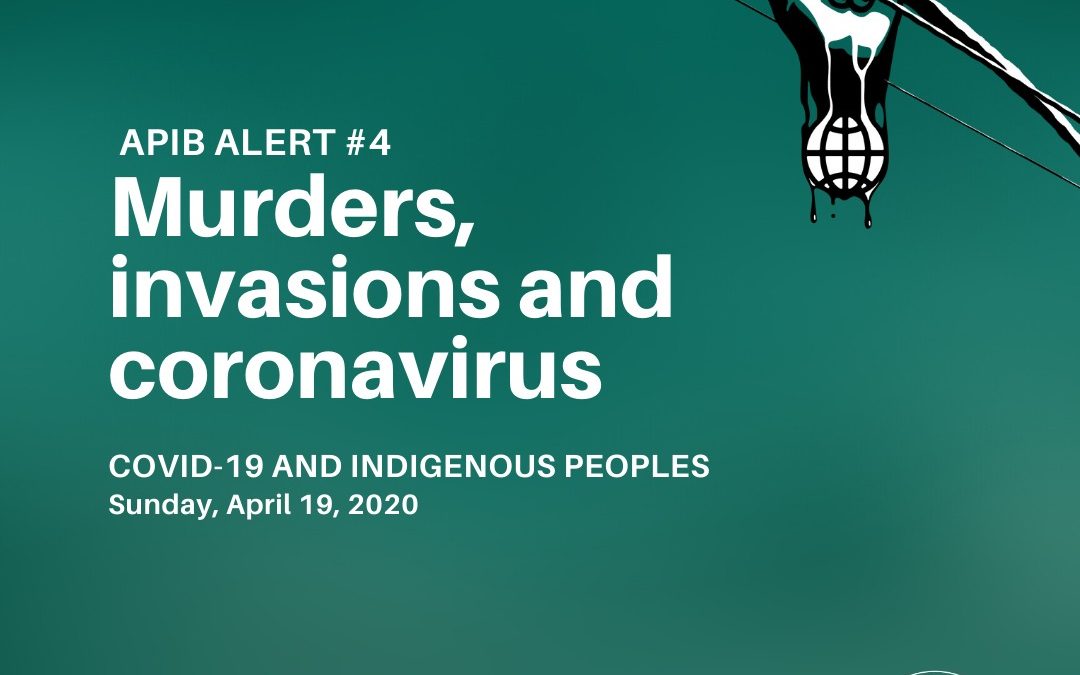
25/Apr/2020
Violence against indigenous peoples is on the rise. On Friday, April 17, Ari Uru-eu-wau-wau was brutally murdered in Jaru, in the state of Rondônia. He was a community monitor in his territory, the Terra Indígena Uru-eu-wau-wau, which is one of the most threatened by the criminal activity of illegal loggers.
Ari’s murder is the second, in less than 20 days, of leaders who work to monitor and protect their territories. Zezico Guajajara was also killed, on March 31 2020, for fighting to defend the rights of his people. Both Ari and Zezico had been threatened, and were working to protect their communities from invasion in order to prevent Covid-19 from arriving on their lands.
The Coalition of Indigenous Peoples of Brazil (APIB) reinforces what we have been saying since the beginning of this pandemic: the Coronavirus is not the only thing attacking us. It is impossible to protect our communities just by isolating ourselves, as the invasions of loggers, miners and land grabbers continue to violate our rights, destroying the environment and increasing the chances of infection by Covid-19.
According to data from the Pastoral Land Commission (CPT), published this Friday (April 17) as part of Red April, in 2019 49,750 indigenous families suffered some type of violence in land conflicts in Brazil. This already alarming situation is only getting worse.
There is an urgent need for action from international human rights organizations to pressure the Brazilian Government to respect the Constitution and to adopt measures to guarantee the protection of indigenous peoples. We will continue to demand an emergency action plan from the Federal Government to protect people’s lives and a serious response from the governors of each state to adopt the measures suggested by APIB, in order to prevent another genocide.
We demand justice for Ari Uru-eu-wau-wau. We extend our sympathy to the family and all the Uru-eu-wau-wau people in this moment of pain. We will continue to fight for NOT A SINGLE DROP MORE of indigenous blood to be shed.
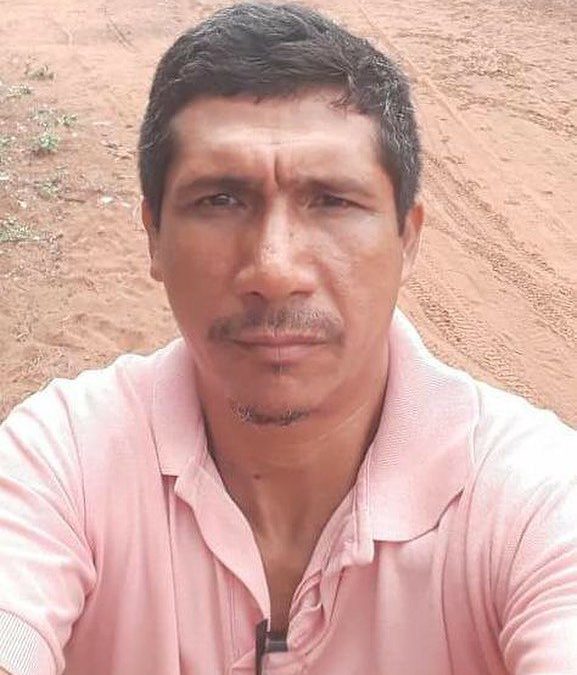
01/Apr/2020
Maranhão, March 31, 2020 – Our indigenous blood continues to be spilled! Zezico Guajajara was murdered and we of the Association of the Indigenous Peoples of Brazil – APIB demand justice! His body was found on Tuesday (31) on the access road to the Arariboia Indigenous Territory, near his village Zutiwa, in the municipality of Arame, Maranhão state.
Zezico Rodrigues is the fifth indigenous Guajajara murdered in the past four months. A great leader, he was known for being a combative and courageous person in the fight for the rights of indigenous peoples and for his own Guajajara people, as well. Zezico was a teacher and director of the Indigenous School Education Center of Azuru, in the Zutiwa village, and was recently elected coordinator of COCALITIA (Commission of Chiefs and Indigenous Leaders of Araribóia Indigenous Territory).
Crime is upon us whilst our efforts are turned the protection of indigenous peoples from the grave risks of the Covid-19 pandemic in Brazil. This fact at hand highlights the worsening on violence and vulnerability of indigenous peoples have been facing, especially the leaders who fight to defend their territories against invaders and constantly denounce the violations committed against their people and the forest.
It is regrettable that the National Indigenous Foundation – Funai, recklessly, had released information that aims to relate the murder of Zezico with internal conflicts of the Guajajara people. We strongly reject this publication, which shows disregard for the history of threats and vilifies Zezico’s memory.
We demand that the Brazilian Federal Police put forth a serious investigation and that this brutal murder in the Araribóia Territory be elucidated. We from APIB show solidarity with Zezico’s family and friends, and with all the Guajajara people in this moment of mourning. We will keep on fighting so that no one more drop of indigenous blood is spilled! #JusticeForZezico










